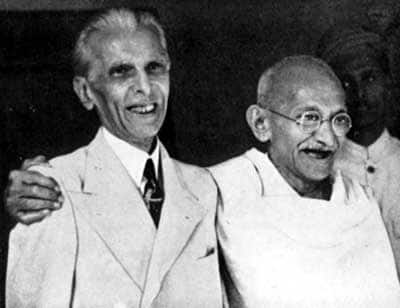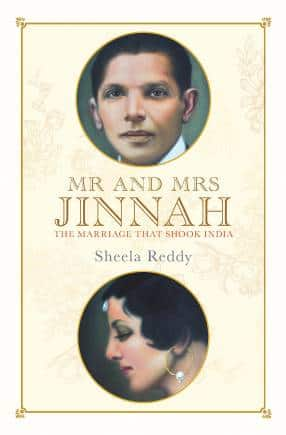



Mohammed Ali Jinnah is perhaps one of the most reviled figures in Indian history. It is easy to hate Jinnah, the man who fought for the creation of Pakistan that resulted in the Partition and the following riots.
But long before he came to be called Quaid-i-Azam, or The Great Leader, and etched his name in history as the founder of Pakistan, Jinnah was merely a barrister, practising law in (as it was then called) Bombay.
To be sure, Jinnah was an exceptional lawyer, and represented some of the wealthiest and the most prominent people of the time. He counted among clients, Sir Pherozeshah Mehta and the Indian freedom fighter Lokmanya Tilak, the latter he also considered his friend.
 Gandhi and Jinnah in Bombay in 1944. (Photo via Wikimedia Commons)
Gandhi and Jinnah in Bombay in 1944. (Photo via Wikimedia Commons)Also among his friends were the businessman Sir Dinshaw Petit. The Petit family was a prominent one; Sir Dinshaw’s father had built some of the earliest cotton mills in India. Their home was Petit Hall, a majestic mansion that once stood at the foot of Malabar Hill overlooking the Arabian Sea.
Also read: Dina Wadia, daughter of Mohammed Ali Jinnah, fought a long legal battle for Jinnah HouseRattanbai, better known as Ruttie, was Sir Dinshaw’s only daughter. Famed for her beauty among the city’s high society, Ruttie led a life of comfort and luxury. If she wasn’t at her father’s mansion in Bombay, Ruttie would be vacationing in manors of Europe or India.
As was wont, her parents spared no expense in her upbringing. Whatever caught her fancy – be it a piece of jewellery or an item of clothing – it was promptly purchased. She is said to have loved pets so much that she insisted on carrying them with her during her travels across the world.
By all accounts, the Petit family was an anglicised and a liberal one. And while Ruttie and her three brothers were initiated into the Zoroastrian faith, no one was known to follow it very religiously.
So, when the teenage Ruttie fell in love with Jinnah, she didn’t once think her family would object to the match. At the time, Ruttie was merely 15 and Jinnah was 40.
Such a match would be considered paedophilia today, but this was the early 1900s and it wasn’t uncommon for girls to be married by this age.
Jinnah foresaw a problem to the match; he was Ruttie’s father’s friend and closer to him in age than to Ruttie. He knew his age would work against him but the fact that he was a Muslim wouldn’t help his case either.
So, during one of his visits to Petit Hall, Jinnah shrewdly cornered Sir Dinshaw into taking a stand on inter-faith marriages. The moment the baronet admitted he supported the idea, Jinnah asked him for his daughter’s hand in marriage. Sir Dinshaw flew into a rage and refused to grant him permission. However, he wasn’t able to hold off the inevitable for too long. The moment Ruttie came of age, she announced to a ballroom of people at her 18th birthday party that she had accepted the marriage proposal from the well-dressed barrister of Bombay.
In the weeks that followed, Ruttie is said to have walked out of Petit Hall and all the way up to the top of Malabar Hill to Jinnah’s home, South Court, converted to Islam and married the man she wanted.
 Very little has been written about this marriage but the most definitive account of it has been narrated in Sheela Reddy’s book Mr and Mrs Jinnah: The Marriage that shook the nation.
Very little has been written about this marriage but the most definitive account of it has been narrated in Sheela Reddy’s book Mr and Mrs Jinnah: The Marriage that shook the nation.
And there is perhaps no better way to have described the marriage between Ruttie Petit and Muhammad Ali Jinnah: it was indeed one that shook the nation. The Zoroastrian community was up in arms. To the conservative in the community, Ruttie represented the young, upstart, elite who were Parsi in name only. They were educated in the ways of the West, raised to be more British than the British themselves, and far too liberal for the conservatives.
Ruttie’s marriage to Jinnah came just 16-odd years after the marriage of Ratan Dadabhoy Tata (father of JRD Tata and not to be confused with Ratan Naval Tata who succeeded JRD) to Suzanne Brière, a Frenchwoman.
For the Parsi Punchayet, the governing body of the small but prosperous community, Ruttie’s marriage was the last straw. They threatened to excommunicate the entire Petit family from ceremonies and rituals. Sir Dinshaw wasn’t happy either. He sued Jinnah to prove he was after his wealth. The lawsuit did not stand. All in all, the marriage would irrevocably destroy Ruttie’s relationship with her family. She remained estranged for the rest of her life. But unbeknownst to everyone, Ruttie wouldn’t have a very long one.
By all accounts, the initial years of the Ruttie-Jinnah marriage were happy. When Jinnah welcomed her into his home – the sprawling but relatively modest South Court – he is said to have ensured her lifestyle wouldn’t be affected. He doted on her; and she was as much in love with him.
Jinnah was married once before but it was far too long ago. It was an arranged match at the behest of his family, but soon after his wedding, Jinnah left for England to study law during which time his first wife passed on.
When he returned to India and set up practice in Bombay, Jinnah was already a widower, having never lived with a woman. He arrived on the shores of the city with little else but the belief that he would become a successful barrister like no one else before him. Driven by this faith in himself, his hard work, and the entrepreneurial spirit of the city, Jinnah accomplished his dream.
During this time, he had moved from a flat in Colaba to South Court, a property he purchased primarily with the intention to be in the right postal code. The property, though modest when compared to the palatial Petit Hall, was a massive one. He did have a butler but the property itself remained bare. This changed when Ruttie walked into Jinnah’s life. Before long she refurbished South Court to reflect her own very fashionable tastes.
By all estimates, the early years of the marriage were filled with joy and laughter. In the first year of their marriage, they were blessed with a daughter who was born on August 15, 1919. But as Jinnah’s involvement in the freedom movement got more intense, his marriage began to crumble. Ruttie is said to have struggled with depression, a condition that wasn’t even recognised back then. Their infant daughter was largely raised by a retinue of nannies. According to Mr and Mrs Jinnah, neither parent gave her a name. It would only be after Ruttie’s death, when she made her way to Lady Petit’s home for the first time, that the young girl would give herself a name: Dina, after her maternal grandmother.
As the marriage came apart, Ruttie’s health declined too. She would spend stretches of time at the Taj Mahal Palace Hotel by herself or in the company of Sarojini Naidu whom she had grown fond of and who took her under her wing.
Eventually, Ruttie would develop complications supposedly due to cancer and on February 19, 1929, on her 29th birthday, Ruttie Jinnah would breathe her last in the city where she was born and fell in love: Bombay.
Ruttie Jinnah is buried at the Shia Ishna Ashari Jamaat Arambaug in Byculla, Mumbai. It isn’t very difficult to locate her grave. All you need ask the caretaker is to point you to Jinnahbhai’s bride and chances are he will escort you there himself.
Accounts suggest that Jinnah blamed himself for her death. He was a fiercely private person but is said to have broken down publicly on two occasions: first at Ruttie’s funeral and then at her grave just before he left for Pakistan in 1947, knowing fully well he’d never get to visit her ever again. Jinnah never married again.
A little over a year later, Jinnah himself would pass away. His final resting place is a mausoleum majestic enough for a nation’s founder. It is located in Karachi, nearly 1,000 km away from the resting place of the woman he loved and lost.
Discover the latest Business News, Sensex, and Nifty updates. Obtain Personal Finance insights, tax queries, and expert opinions on Moneycontrol or download the Moneycontrol App to stay updated!
Find the best of Al News in one place, specially curated for you every weekend.
Stay on top of the latest tech trends and biggest startup news.